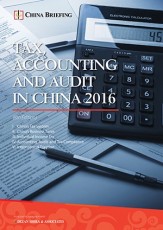Case Study: Capital Gain Tax Treatment- Part 1: Taxation Under the China-Hong Kong Double Tax Agreement
By Ines Liu
Hong Kong entered into a Double Taxation Arrangement (DTA) with China in 2006. The treaty acts as a way to avoid double taxation and clamp down on tax evasion, improving ties between both jurisdictions by reinforcing their respective tax laws, encouraging competition, and promoting investment. A fourth protocol was signed on April 1, 2015, amending four key aspects of the DTA. One of those aspects was tax exemption for capital gains derived by foreign investors that sell shares of a China based company, which we explore in detail below.
Capital Gain Tax Exemption Eligibility for Foreign Companies Selling Shares: Scenario
A global high profile venture capital holding company has a subsidiary incorporated in Hong Kong (Company A). Company A holds an aggregate of shares (above 25 million) of a China listed company (Company B). After a 12-month restricted stock trade period, Company A looks to sell shares of Company B, but wants to know how to meet the requirements for capital gains tax exemption under the tax treaty.
Analysis
Overall, withholding tax applies to capital gains derived from transferring Company B’s shares. However, the DTA states that:
- “Income or gains derived by a resident of a Contracting Party from the alienation of shares or comparable interests in a company, the assets [Asset value] of which consist wholly or principally [No less than 50 percent] of real property in the other Contracting Party, may be taxed in that other Party.”
 RELATED: Tax and Compliance Services from Dezan Shira & Associates
RELATED: Tax and Compliance Services from Dezan Shira & Associates
In practice, this means that the capital gain from such a transfer can be tax exempt if:
- At any time during the twelve-month period preceding the transfer, Company A had participation – direct or indirect – of less than 25 percent of the capital of Company B;
- No more than 50 percent of Company B’s shares being transferred were derived from immovable property in China.
Requirements
Immovable Property Percentage
As mentioned above, a requirement for tax exemption is that the percentage of value of immovable property not exceed 50 percent. The State Administration of Taxation (SAT) defines ‘immovable property’ as including various kinds of buildings for business or non-business purposes, land use rights, and property accessory to immovable property. The assets and immovable property of a company will be recognized and valued under the prevailing accounting system in China in respect of asset treatment at that time (without taking liabilities into account). However, the value of the land or land use rights included in the relevant immovable property cannot be less than the market price of a comparable piece of land located in a similar district.
From Company B’s audit reports from the last three years, Dezan Shira & Associates calculated the value of immovable property and found that the percentages of total immovable property assets were lower than 50 percent, meaning that Company B was applicable for tax exemption.
Equity Share Holding Percentage
The equity transfer may potentially enjoy tax exemption as well. However, as previously mentioned, if the capital participation equaled 25 percent or more in the 12 months prior to the transaction, capital gains will be subject to taxation in China. Moreover, it is critical to further check that shareholding was less than 25 percent in the 12 months prior to the transfer date, as the ratio of Company A’s shares might have changed from the start of Company B’s listing date to the current transfer date.
According to Company B’s 2015 financial year annual report and an official listed company online database, Company A held less than 25 percent of Company B’s total issued share capital. Therefore, the share transfer may also enjoy tax exemption.
![]() RELATED: Business Advisory Services from Dezan Shira & Associates
RELATED: Business Advisory Services from Dezan Shira & Associates
HK Tax Resident Certificate
Possession of a Tax Resident Certificate (TRC) is also a key requirement for tax exemption under the DTA. The Hong Kong Inland Revenue Department (IRD) will conduct a substance test when issuing the TRC. The test will consider factors such as nature of business, staff and remuneration, management and control, number of bank accounts and where income is derived. So far, Company A doesn’t qualify for the Hong Kong TRC. Therefore, Company A is not eligible for the tax exemption.
As a note, tax exemption eligibility also depends on whether the source of income derived from dividends, interest and royalties is from the beneficial owner, which is not expressly specified in the current DTA. The fourth protocol of the DTA introduces an article regarding anti-treaty abuse provision for capital gain on dividends, interests and royalties. It points out that, if an entity’s main purpose is to enjoy the DTA’s preferential tax policy, then it might be ineligible, and the Chinese side could use the domestic General Anti-Avoidance Rule (GAAR) to prevent treaty abuse. Chinese tax authorities assess GAAR cases by means of a purpose test and a substance test. In this case, if Company A was an operating entity, it would have fared well against GAAR challenges, since its purpose and substance are relatively easy to indicate.
However, as Company A is not eligible for tax exemption under the DTA, withholding tax is levied on Company A’s sale proceeds. Dezan Shira & Associates successfully handled the withholding tax procedure for Company A in its first round of share sales, and will continue to assist in subsequent share selling rounds.
|
Asia Briefing Ltd. is a subsidiary of Dezan Shira & Associates. Dezan Shira is a specialist foreign direct investment practice, providing corporate establishment, business advisory, tax advisory and compliance, accounting, payroll, due diligence and financial review services to multinationals investing in China, Hong Kong, India, Vietnam, Singapore and the rest of ASEAN. For further information, please email china@dezshira.com or visit www.dezshira.com. Stay up to date with the latest business and investment trends in Asia by subscribing to our complimentary update service featuring news, commentary and regulatory insight.
|

 Tax, Accounting, and Audit in China 2016
Tax, Accounting, and Audit in China 2016
This edition of Tax, Accounting, and Audit in China, updated for 2016, offers a comprehensive overview of the major taxes that foreign investors are likely to encounter when establishing or operating a business in China, as well as other tax-relevant obligations. This concise, detailed, yet pragmatic guide is ideal for CFOs, compliance officers and heads of accounting who must navigate the complex tax and accounting landscape in China in order to effectively manage and strategically plan their China-based operations.
 An Introduction to Doing Business in China 2016
An Introduction to Doing Business in China 2016
Doing Business in China 2016 is designed to introduce the fundamentals of investing in China. Compiled by the professionals at Dezan Shira & Associates in June 2016, this comprehensive guide is ideal not only for businesses looking to enter the Chinese market, but also for companies who already have a presence here and want to keep up-to-date with the most recent and relevant policy changes
 An Introduction to Doing Business in Hong Kong 2016
An Introduction to Doing Business in Hong Kong 2016
Doing Business in Hong Kong 2016 is designed to introduce the fundamentals of investing in Hong Kong. Compiled by the professionals at Dezan Shira & Associates, this comprehensive guide is ideal not only for businesses looking to enter the Hong Kong market, but also for companies that already have a presence here and want to keep up-to-date with the most recent and relevant policy changes.
- Previous Article Gaining Direction: Navigating China’s Direct Sales Industry
- Next Article China Set to Implement New ‘Five-in-One’ Business License











